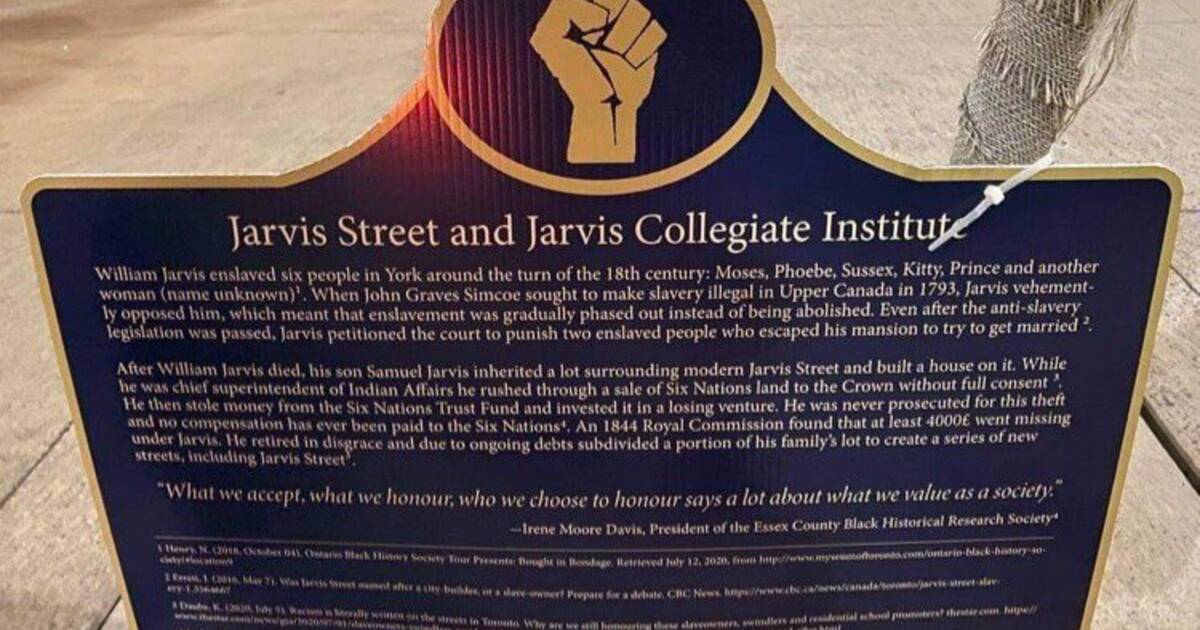
Numerous plaques have been spotted around Toronto detailing the racist, slaving-owning histories of some of the prominent families for which many of the city's streets are named — leading some residents to demand that they be renamed.
The new heritage plaques, which were installed by one individual who has chosen not to identify themselves to the public, have popped up in numerous locations across the city, including in the Baby Point area and near Bloor and Jarvis.
There's another for William Jarvis, slave owner, near Bloor and Jarvis. https://t.co/CWN6n2ZlTM
— Josh (@JoshMLabelle) August 15, 2020
The Baby Point plaque tells the history of Jacques "James" Baby, for which Baby Point Crescent, Baby Point Road and Baby Point Terrace are all named, and it explains that the judge and political figure enslaved at least 17 Black and Indigenous people in the late 18th and early 19th centuries in Canada.
The plaque states that he also opposed Lieutenant Governor John Graves Simcoe's efforts to put an end to slavery in Upper Canada.
"In summary, Jacques 'James' Baby was a human trafficker who kidnapped and held Black and Indigenous people captive, forcing them to complete unpaid and brutal labour," the plaque reads.
I live in the Baby Point area. I had no idea about the Baby family's slave ownership. More history, more context, more compassion. Right on to the anonymous person who did this!
— Douglas Orme (@douglasorme) August 24, 2020
The Jarvis plaque, meanwhile, recounts the history of William Jarvis, after whom both Jarvis Street and the Jarvis Collegiate Institute are named.
The sign explains that Jarvis enslaved six people around the turn of the 18th century, and that he, too, vehemently opposed Simcoe's efforts to abolish slavery in Upper Canada.
"Even after the anti-slavery legislation was passed, Jarvis petitioned the court to punish two enslaved people who escaped his mansion to get married," it reads.
The historical explanation also states that after his death, Jarvis' son sold Six Nations land without full consent and then stole money from the Six Nations Trust Fund to invest in a losing venture — a theft for which he was never prosecuted.
Both plaques also include a quote from Essex County Black Historical Research Society president Irene Moore Davis: "What we accept, what we honour, who we choose to honour says a lot about what we value as a society."
Once Davis became aware of the plaques, she tweeted about them in hopes of finding out who was responsible, and she also said the "signs are well written and accurate."
I’m dying to know who has put up these signs in Toronto, pointing to the real history of the slave-owning Jarvis and Baby families, and quoting me. The signs are well written and accurate, even including end notes. Person or group who’s doing this, I’d love to work with you! pic.twitter.com/RpvEJxTUVT
— Irene Moore Davis (@IreneMooreDavi1) August 22, 2020
Davis later wrote that the person behind the signs did present themselves to her and is simply "one Toronto resident who wants to right the record," but that they wish to remain anonymous.
Regardless, the plaques have arguably already made in impact, with a number of Toronto residents taking to social media to call for the renaming of the streets associated with these problematic historical figures.
Can we please rename Baby Point for obvious reasons above, but also because it’s CREEPY AF? Dundas needs to go too, and Jarvis- honestly get rid of all the street names and let’s start over. And don’t cry that this is TOO much, it’s not EVEN enough.
— faith_salon (@faith_salon72) August 23, 2020
One Torontonian even argued that the Jarvis Collegiate Institute should instead be named after Raptors star Kyle Lowry.
I think that Kyle Lowry not having a street or major road named after him is offensive. William Jarvis recorded ownership of 6 black slaves in the 1799 census. How about we change Jarvis C.I. to Kyle Lowry C.I. and call it a day.
— Sun Flowry (@Jotabonito) August 3, 2020
The calls to rename Toronto streets and institutions that bear the names of racist historical figures are far from new, and have been ongoing since the beginning of the Black Lives Matter movement in May.
Rename Dundas. Rename Baby Point #Toronto #BlackLivesMattters #endimperialism
— October1979 (@October19791) June 9, 2020
Calls to rename Dundas Street have been the most prominent since that time, as many discovered that Henry Dundas was a Scottish politician that actively worked against the abolition of slavery.
Back in June, Mayor John Tory announced that the city would begin to explore options for renaming Dundas following the circulation of a petition that garnered nearly 15,000 signatures.
Most recently, City Manager Chris Murray reported back with a seven-page-long briefing note in which he laid out four possible options for responding to the community petition.
A decision, however, has yet to be officially made by the city.
by Mira Miller via blogTO

No comments:
Post a Comment